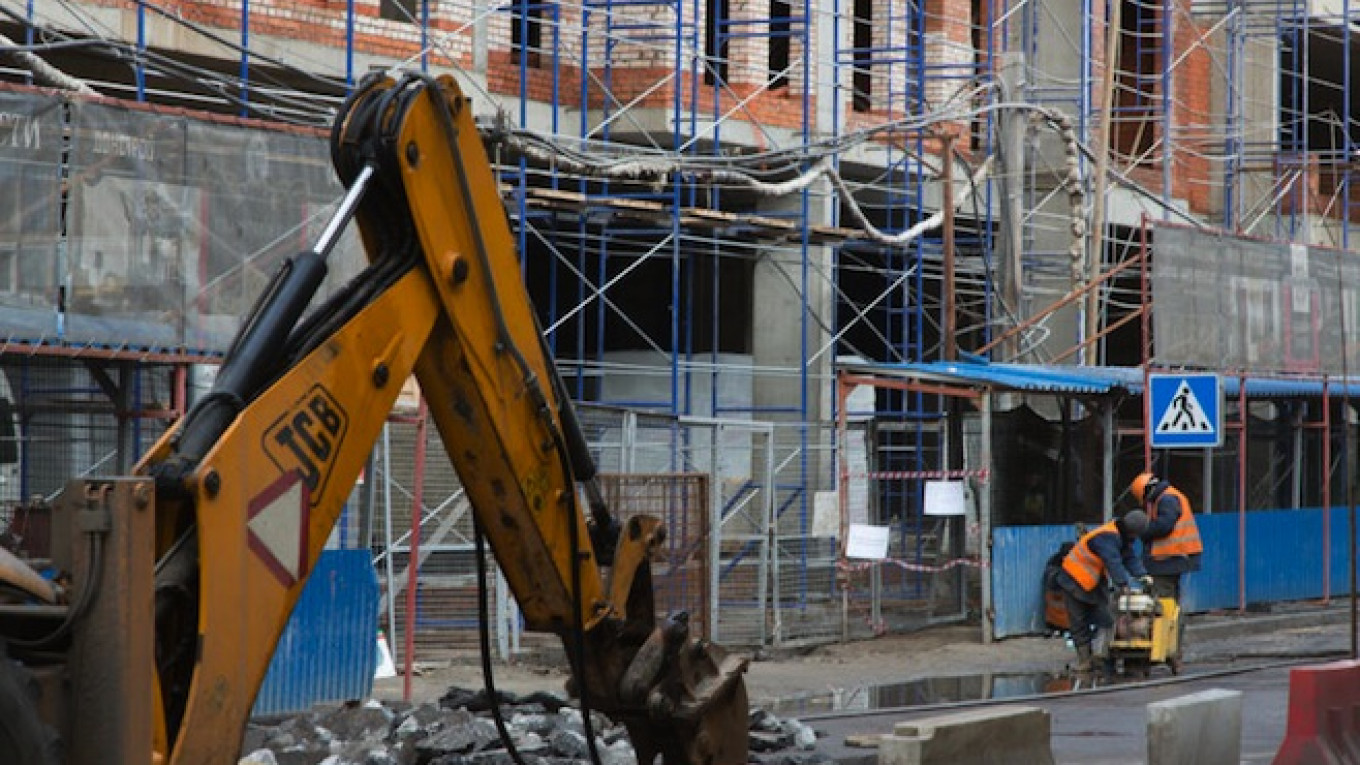Construction companies are finding it increasingly hard to raise money, as banks, spooked by bad loans and wary of the watchful eyes of the Central Bank and ratings agencies, hike lending rates and cut back the share of real estate assets in their portfolios.
The issue rose starkly during a round table discussion in the Moscow City Duma last week. Sergei Serov, a vice president at Promsyazbank — Russia's 10th-largest lender, according to RIA Rating — told the assembled officials, company representatives and experts that banks sometimes cannot lend even when they believe in a project.
"Maybe we want to [finance a project] … but there are external factors, international auditors and ratings agencies who say that we cannot," Serov said. That might be tough on builders, but on the bright side, "there will not be an Olympics in Moscow in the near future," he added, with a splash of bitter humor.
Two of the builders involved in constructing Russia's $51 billion Games — Mostovik and Tonnelny Otryad 44 — declared bankruptcy soon after the event while another, Mozhinstroi, was liquidated, and their shadow still hangs over the construction industry, said Egor Dvinyanin, an analyst at financial consultancy Gradient Alpha. "Of course, such demonstrative events impact banks' relations to the industry, and in the end everybody suffers," Dvinyanin said.
Banks are now seeking to cut real estate's share in their loan portfolios, and hence turning away construction companies with new projects, said VTB Capital analyst Marina Kolbina.
The Olympic hangover is one factor behind this. But the decline in financing is also a result of increasingly sophisticated risk assessment in Russian banking, Kolbina said.
"Banks are pricing risk now," agreed David Simons, managing director of warehouse developer Radius Group. As little as one or two years ago, Russian banks were significantly more lax in their lending practices, he said.
This heightened scrutiny has been accompanied by a hike in lending rates, which have on average climbed by 1 to 1.5 percent since the beginning of the year, said Yelena Podlesnykh, a partner with real estate broker Cushman & Wakefield. Borrowers now face final interest rates of around 9.5 percent, Simons said.
The increase is partly a result of poor economic growth forecasts — which currently hover around 0.5 percent for 2014 — and higher Central Bank rates. With a wary eye trained on early June's 7.6 percent inflation rate, the regulator decided last week to hold its key interest rate at 7.5 percent amid widespread economic uncertainty issuing from the political crisis in Ukraine.
While the economic slump and Olympic aftertaste are aggravating the situation, the sudden financing drought may also be a natural come-down after a period of intense activity and less-than-stringent practices, both by contractors and banks themselves.
For a long time, Russian contractors would gun for government contracts with little concern for correct accounting, counting on the widespread expectation that the government would bail them out if necessary.
"They thought: 'The most important thing is to win the contract, than we will see,'" said Gradient Alpha's Dvinyanin.
But as the state cuts spending amid budget strains, these contractors have found themselves suddenly called to account. "Many have been forced to cover the difference between initial and final costs themselves, can't sustain the burden and are going bankrupt," Dvinyanin said. "Now the share of internal funds [which constructors themselves bring to a project] should be 35 to 40 percent for a bank to even consider an application."
In the long run, the absence of easy money will likely cull out the many small players who populate the current, fragmented construction industry, Simons said. Instead, we may see a transition to a more mature European-style system, he said: a smaller number of large companies who can stand up to bankers' scrutiny.
See also:
Sochi Olympic Organizers Report $261 Million Profit
Contact the author at [email protected]
A Message from The Moscow Times:
Dear readers,
We are facing unprecedented challenges. Russia's Prosecutor General's Office has designated The Moscow Times as an "undesirable" organization, criminalizing our work and putting our staff at risk of prosecution. This follows our earlier unjust labeling as a "foreign agent."
These actions are direct attempts to silence independent journalism in Russia. The authorities claim our work "discredits the decisions of the Russian leadership." We see things differently: we strive to provide accurate, unbiased reporting on Russia.
We, the journalists of The Moscow Times, refuse to be silenced. But to continue our work, we need your help.
Your support, no matter how small, makes a world of difference. If you can, please support us monthly starting from just $2. It's quick to set up, and every contribution makes a significant impact.
By supporting The Moscow Times, you're defending open, independent journalism in the face of repression. Thank you for standing with us.
Remind me later.






